Current as of: January 7, 2025 - 17:04

The Tropical South Trip Notes
- Ways to Travel: Guided Group, Private Group Adventures
- Destination: India
- Programmes: Culture
-
Activity Level:
2 out of 7 - Easy & Moderate
- 14 Days: Land Only
- Ages: 16+
- Trip Code: AIT
- Carbon Footprint: 21kg CO2e
Trip Overview
Find peace and paradise in India’s two southernmost states: Kerala and Tamil Nadu
Discover the laidback side of India with a cultural adventure in the tropical south. Over two weeks, we explore the distinct states of Kerala and Tamil Nadu, finding idyllic coastlines, spirituality, lush mountains and culture-rich cities. The highlights are plenty: discover the verdant Munnar tea plantations, meet local people on an immersive village walk and cruise the serene backwaters of Kerala on a traditional converted rice barge. It ends with a relaxing stay on the old hippie trail beach town of Kovalam.
At a Glance
- 3 Superior nights (hotels), 10 Classic nights (9 hotels, 1 houseboat)
- Travel by private air-conditioned bus
- Group normally 4 to 16, plus leader. Minimum age: 16
Highlights
- Experience India’s laid-back side on a small-group adventure in the south
- Embark on a tour of the historic landmarks in the old spice port of Kochi
- Trek through the vivid tea plantations in Munnar with an expert local guide
- Witness the temple town of Madurai wake from its slumber on a dawn city walk
- Search for elephants, wild pigs and more on a nature walk in Periyar Wildlife Sanctuary
- Cruise the backwaters of Kerala on a traditional rice barge – a classic experience in South India!
Is This Trip for You?
This trip is rated Activity Level 2 (Easy & Moderate). For more information on our trip gradings, visit the Activity Level Guidelines page. If you have any queries about the difficulty of the trip, please contact us.
Although not a demanding tour, it is a busy and active itinerary with lots to see. Driving time is kept to a minimum and is not normally longer than four to five hours except on Day 5 when the drive to Madurai can take up to seven hours. Prepare for some early starts. The roads are generally pretty good, but traffic and/or road damage can sometimes slow us down.
Hiking: A slightly more difficult trek (Activity Level 2) in Munnar requires a good level of fitness, as the trail can be steep in places, although the route mostly winds gently up through the plantations. Walking shoes (or trainers/sneakers) with a good grip are recommended for this trek and you may also wish to bring walking poles or get hold of a stick locally if you have problems with your knees. The approximate walking time is three hours, and the distance around 3.4mi (5.5km).
Monuments: The Archaeological Survey of India (ASI) is responsible for the conservation of many monuments in India and very occasionally this may mean that work is taking place at sites visited on this trip. The ASI schedule is never published so it is not possible to forewarn our clients of when work will be taking place.
Group
Our Indian team of leaders has proved very popular with their incredible knowledge, passion and hospitality adding greatly to the experience. There is no better way to experience Indian culture than letting an Indian guide show you around their country.
Adult min age: 16
Min group size: 4
Max group size: 16
Itinerary
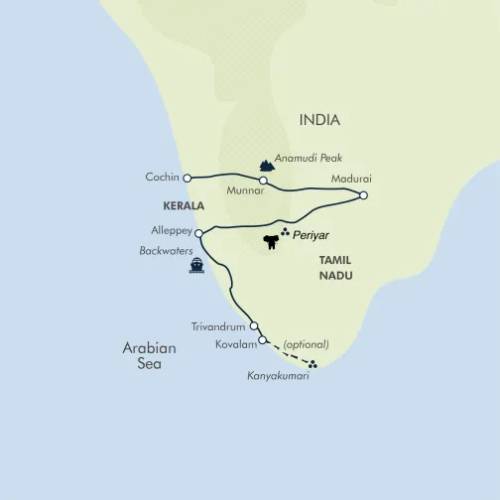
Land Only
- Start City: Kochi (Cochin)
- End City: Kovalam
Land Only Itinerary
Flights usually depart London in the afternoon.
The adventure starts in Kochi (formerly Cochin) on the Malabar (or Pepper) Coast. It’s believed to have been the first European settlement in the country and retains a relaxed atmosphere, despite recent growth. You can arrive at the hotel at any time, but check-in is normally from 2pm.
After, we have free time to explore or relax. Alternatively, for those arriving in time, join an afternoon harbour cruise around Fort Kochi (please arrive at the hotel by 1pm to join the cruise).
Accommodation: Abad Atrium Hotel (or similar)
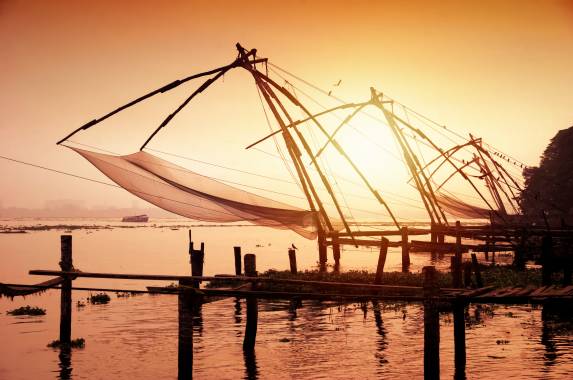
Today we take a sightseeing tour of Kochi, taking in the adjacent historic neighbourhoods of Fort Kochi and Mattancherry. In Fort Kochi, we’ll visit St Francis Church, where Portuguese explorer Vasco de Gama died in 1524; see Santa Cruz Cathedral, originally used as a warehouse by the British; and wander past fishing nets lining the harbour entrance, which were introduced by the Chinese in the late-14th century.
In Mattancherry, we visit Mattancherry Palace, built by the Portuguese in the mid-1500s in a traditional Keralan style, and Jew Town, once home to a Jewish community and now a great place to peruse antique shops and warehouses. Those interested can visit Thomas Chettan in the Little Queen Embroidery shop to learn about hand lace work, a dying art using bobbin lace.
There is the option in the late afternoon to see a Kathakali dance performance. Please note, a similar show is also available in Periyar on Day 8.
Accommodation: Abad Atrium Hotel (or similar)
After breakfast, we drive away from the coastal plain to Munnar, which is set among the highest mountains in Kerala. The drive is 100mi (160km) and should take approximately five to six hours.
Munnar is a beautiful hill station on the Western Ghats, once a summer resort for the British government. It is situated at the confluence of three mountain streams (Mudrapauzha, Naliathanii and Kundala) and is surrounded by lakes, reservoirs, forests and several tea estates. Anamudi, the highest peak in southern India at 9,725ft (2,695m), dominates the skyline and the many smaller peaks are a walker’s paradise.
In the afternoon, we visit Srishti, a charitable trust aiming to improve life for people with disabilities from the tea planter families of Munnar. They are trained for three industries – deli (bakery), aranya (cloth dyeing) and atulya (paper making). It’s wonderful to see their work and learn about the organic products used for dyeing and making paper. Please note, the Srishti organisation is closed on public/religious holidays and may also close at short notice due to operational reasons. Your tour leader will update you on any changes to the itinerary in these instances.
Accommodation: Eastend Hotel (or similar)
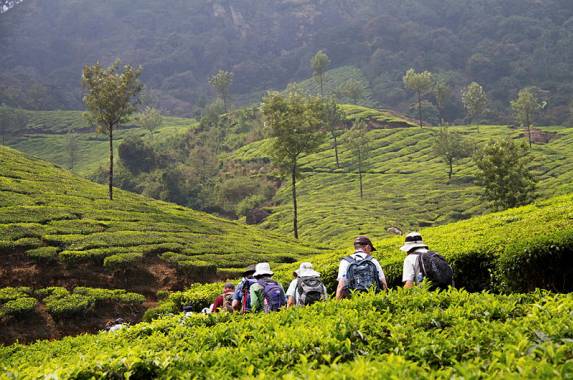
After an early breakfast, we take a short drive through old Munnar and travel down to the tiny village of Nagarmudi, where we start our trek accompanied by a local guide. It begins with a long, gradual ascent winding through tea plantations and then climbs into the Seven Malai Hills. Our hard work is rewarded with spectacular views over Chittrapuram Dam, Changulam Lake, Anamudi, Munnar and other villages (weather dependent). We then descend back to our vehicle. Please note, there are a couple of steep ascents and descents on this trek, but the pace is slow and steady with plenty of rest stops along the way.
In the afternoon, there is also an optional visit to a tea museum followed by an optional tea-tasting session.
Accommodation: Eastend Hotel (or similar)

Leaving Kerala, we drive 100mi (165km) through the hills to the colourful temple town of Madurai, in Tamil Nadu. The drive should take approximately six to seven hours, arriving mid-afternoon.
After an early dinner, you can join an optional tour to witness the nightly closing ceremony at the Sri Meenakshi Temple. You are whisked into the city centre in a tuk tuk convoy, led by your local guide, to a historic Hindu temple on the bank of the River Vaigai dedicated to Parvati, known as Meenakshi, and her consort, Shiva, here named Sundareshwara. The ceremony can happen at any time after the temple closes for the night (approximately 9.30pm), so you may need to wait for an hour or so to witness the extraordinary procession but it’s well worth it. Your local guide will walk you through the temple explaining the purpose of the ceremony and bringing the temple history and culture to life. We recommend applying mosquito repellent before leaving for the temple (including feet as you are barefoot inside). You will likely be back at the hotel, depending on the ceremony time, between 10.30pm and 11pm.
Accommodation: Hotel Germanus (or similar)
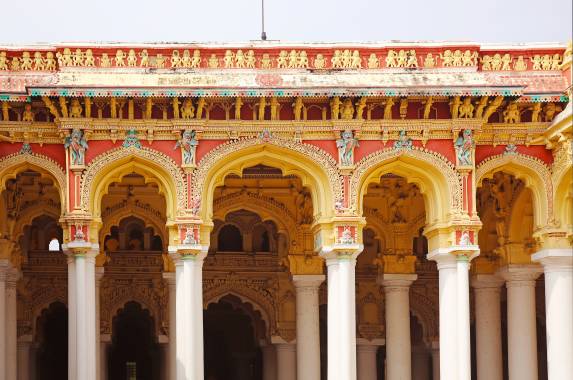
We rise early morning for what many consider a highlight of this trip! Walking in small groups through Madurai as the sunrises and the city wakes, we observe the community going about their everyday life: milking cows, creating kolams (intricate artworks on the floor) and preparing breakfast at roadside food stalls. Along the way, try local drinks and a snack to keep you going. Ending the morning walk at the most famous landmark in the city, we visit the Sri Meenakshi Temple, an outstanding example of Vijayanagar temple architecture, built between the 16th and 18th century. It is a hive of activity and the scene of an almost continuous religious festival. We return to the hotel for a late breakfast and relax.
This afternoon, we delve back into the city, this time taking in the Thirumalai Nayaka Palace, built in 1636 in the Indo-Mughal style by the Nayak dynasty, and the Gandhi Memorial Museum, where you can see a visual biography of Gandhi containing photos, paintings, sculptures, manuscripts and copies of his letters. After the memorial visit, we stop at the local flower market before returning to the hotel.
In the evening, there are many restaurants to visit; some of the best are on rooftops with fantastic city views.
Accommodation: Hotel Germanus (or similar)
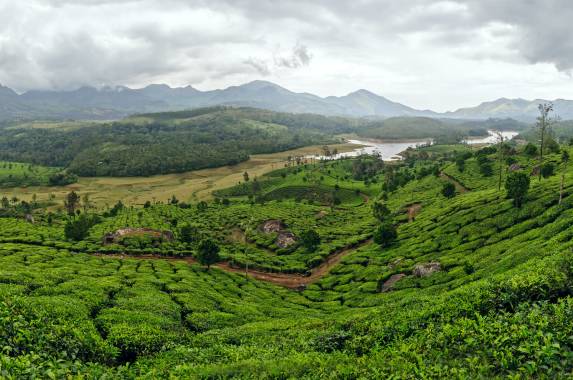
Leaving Madurai in the morning, we drive to the small bustling village of Thekkady. The drive is spectacular as the road climbs through the Western Ghats and we have fantastic views across Tamil Nadu (driving time approximately four to five hours). In the afternoon, we have free time to explore the village and bazaar, where we can visit shops selling cardamom, vanilla, peppercorns, turmeric and other spices.
The whole area is a centre for spice growing, and this evening there is a short walk around a spice garden, where we see many different spices growing. We then have a special dinner and a cooking demonstration with a local family in their home.
Accommodation: Peppervine Hotel (or similar)

Before breakfast, we join our local guide for a nature walk in Periyar Wildlife Sanctuary, one of the largest parks in India (approximately two to three hours) and return to our hotel for breakfast.
In the afternoon, there is the option to join a boat cruise on the lake. This is an ideal way to get close to the animals and we may spot elephants, otters, wild pigs and buffalos. There is also an abundance of bird life – kingfishers, storks and hornbills are the most spotted. Tickets can be purchased online in advance (approximately 900 rupees/US$10.90 per person, minimum four people). We recommend doing this to avoid a long wait at the ticket office. Please inform your leader on Day 1 if you wish to book this in advance as it’s also popular with domestic tourists and last-minute booking requests may lead to disappointment.
Other optional activities today include an Ayurvedic massage, Kathakali dance show, and a martial arts performance.
Accommodation: Peppervine Hotel (or similar)
We head to Kumarakom today, a cluster of small, picturesque islands around Vembanad Lake. The journey takes around 3hr 45min, but we stop en route at the Kanjirapally Plantation Bungalow, which sits within a serene rubber plantation. Here we take a walk through the estate and watch a rubber-tapping demonstration, before a traditional Keralan lunch with the resident family.
Accommodation: Renai Green Fields (or similar)
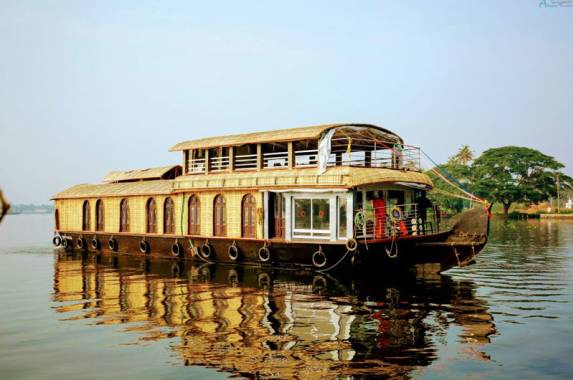
We start before breakfast today (approximately 6am) to embark on a village exploration in the cool morning air. The journey begins in a shikhara boat, cruising to the banks of Manjira village. Through our local guide and the community, we learn about many of their practices and products, including the art of climbing a coconut tree and coconut leaf weaving. We also see a skilled fisherman cast his net and enjoy a stroll by the green paddies. For a light refreshment, try a freshly cut coconut before learning about (and sampling) fresh Kerala toddy, a specialty of the area.
Return to the hotel for breakfast before checking out and continuing our journey. Stopping en route, we visit the Coir Museum, learning how coconut husks were historically manufactured and how so many products we use daily are created.
At midday, we board a houseboat and journey along the Kerala backwaters – one of the trip highlights! These enchanting boats, built of anjili (wild jack) wood and bamboo, transported goods for hundreds of years; now, they have been decorated and made into comfortable cruise boats. As we meander through tropical vegetation, we can see prolific bird life and gain a different perspective on village life. The cruise takes us along shallow, palm-fringed canals where coconut fibre, coconut meat, and cashews are loaded onto dugout canoes. In the evening, we anchor by a bank and watch the sun set over the paddy fields.
Accommodation: Houseboat

After breakfast, we leave our houseboat in Alleppey and drive (approximately four to five hours) along the scenic Malabar Coast to the beach town of Kovalam. We visit Mannarasala temple en route, which is decorated with more than 100,000 snake images. Couples seeking fertility come here and your tour leader will explain the origin of snake worshiping. Continuing, we stop in Quilon for a tea break before arriving at our destination. Once a relaxing hideaway on the old hippie trail, Kovalam has now been discovered, but the influx of tourism has not diminished this beautiful setting. Our hotel is on a cliff with easy access to the beach below.
Accommodation: Soma Palmshore (or similar)

Today is free to unwind on the sandy beach or visit the shops for last-minute souvenirs. This is a great chance to enjoy fresh seafood from one of the many small beach restaurants. Try tandoori dishes – the clay ovens add an exquisite taste to bread and curries.
You could also join an optional day’s sightseeing from Kovalam to Kanyakumari, the end point of India where three oceans meet: the Indian Ocean, Arabian Sea and Bay of Bengal. If it’s open, the trip can also take in the old wooden palace at Padmanabhapuram (extra cost), a wonderful building with fantastic wood carvings, and the Hindu temple at Suchindran, with amazing stone carvings. This trip can be booked and paid for locally. Please note, it is a long day (approximately 8am-6pm) and roads can be prone to traffic delays, but it’s always a popular activity.
Accommodation: Soma Palmshore (or similar)
This morning is free, allowing you the chance to make use of the hotel pool or unwind on the beach. Alternatively, you could join an optional excursion to Vizhinjam. A trip to this popular harbour and fishing village gives you the chance to see fishermen readying and repairing their nets and taking part in the fish auction.
In the afternoon, we explore Thiruvananthapuram, the capital of Kerala. Here, we see the impressive golden façade of the Padmanabhaswamy Temple, one of the richest temples in India. We also visit the Kuthiramalika Palace, built in 1840 for maharaja Swathi Thirunal Balarama Varma; the Napier Museum, an art and natural history museum, and the Sree Chitra Art Gallery, which showcases the work of Indian artist Raja Ravi Varma and more.
Accommodation: Soma Palmshore (or similar)
The adventure ends today. Begin your return journey home or, if you’d like a bit more time to explore Kovalam, speak to your sales representative about extending your stay.
Please note, airport security does not permit any spices/pepper to be carried in hand luggage so please pack these in your main luggage. Electronic devices and batteries should be packed in hand luggage as these are not permitted in your hold/main luggage.
Accommodation
Hotels and houseboat
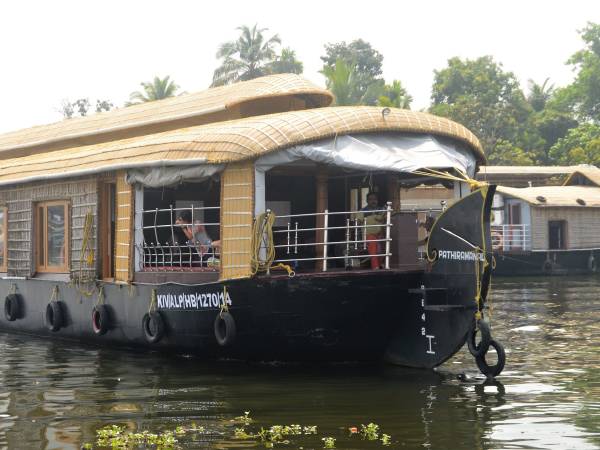
We spend our nights in a mixture of hotels and on a traditional Keralan houseboat. Our hotels are all in the heart of the towns we stop in. Your first hotel in Kochi is conveniently situated in the commercial hub, close to the main textile and jewellery shops plus plenty of restaurants.
The accommodations typically used are on the day-to-day itinerary. However, below are a few of the notable accommodations on this trip.
Peppervine Hotel, Thekkady
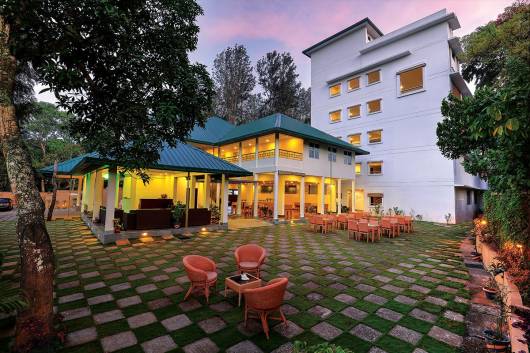
The four-star Peppervine is conventiently located for our adventures, close to Periyar Tiger Reserve and a short walk from Kumily town (the local town name of Thekkady) where you’ll find plenty of shopping options, including locally grown spices and an eclectic assortment of souvenirs. Surrounded by woodland, the hotel offers comfort and tranquillity, with spacious bedrooms, an outdoor swimming pool and open-air restaurant. So close to wildlife, you won’t find it hard to spot the monkeys swinging in the neighbouring trees as you relax.
Keralan houseboat, Alleppey
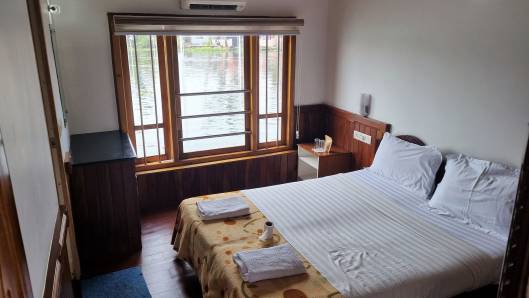
No trip to Kerala is complete without a houseboat stay. Typically, the boats are converted barges (known locally as kettuvallam), once used to transport rice from farm to market. All cabins have private bathrooms and the staff will keep you well fed. The houseboats have a deck and dining area, although the style/layout varies between boats. There is a cook, driver and assistants for each boat and the food is traditional Keralan fare using local produce. Houseboats have two to five twin-bedded rooms. Larger groups may be split over several boats; however, the group reunites at riverside stops and the overnight anchor point where your leader will be available.
Worth knowing
- Indian hotels usually do not have heating. However, you can request more blankets or the hotel may be able to provide a standing heater for your room (subject to availability). Please talk to your tour leader if you need help in this matter.
- Please note, single rooms are very limited on the houseboat so cannot be guaranteed and you may be required to twin share for this night.
Single supplement from £ 410
Food & Drink
The included meals are detailed on the day-to-day itinerary. Allow at least 1,650 rupees (approximately US$20) per day for lunch and dinner where these are not included. You can eat out very cheaply in India, but if you mainly eat at the more expensive restaurants, you will spend more than the suggested amount.
In most of the towns there is a good choice of restaurants and a choice between Indian and Western-style foods. If you are a vegetarian, India is probably one of the best destinations to visit. Tea and soft drinks are very cheap but a large bottle of beer is approximately 500 rupees (US$6). Please note, due to Kerala state laws, alcohol licenses are limited to one or two bars in each area and not all hotels are permitted to serve alcohol. The first day of every month and certain holidays in India are dry days, when no alcohol is permitted for sale.
Mineral water is available in the bus in large containers so please bring a bottle with you to refill. Please note, restaurant service can be quite slow.
Transport
All transport, unless otherwise stated, is by private air-conditioned car or minibus, and backwater cruising in typical Keralan houseboat.
Some optional excursions, particularly in Madurai, use tuk tuks to navigate the busy traffic. These are sourced by our tour leader or local guide on the day.
Weather & Seasonality
The most important feature of the Indian climate is the wet season or monsoon. The main monsoon strikes the Kerala coast in late May and sweeps northward over the next month or so. The ideal time to visit is during the dry season from October to March. Days will be hot and the nights warm, the average maximum daytime temperatures are 21C-30C (70F-86F) and 6C-20C (43F-68F) at night. In the hills, temperatures can be considerably cooler and may near freezing point at night.
Frequent rainstorms occur in November. However, they are usually quite short, and the sun normally comes out quickly afterwards. Please note, swimming in the sea at Kovalam is not always possible, depending on recent weather conditions; however, the hotel we use in Kovalam has a pool.
Joining Instructions
Key information
Start hotel: Abad Atrium Hotel, Mahatma Gandhi Rd, Shenoys, Kochi, Kerala 682035
Phone: +91 484 238 1122
Recommended arrival time: Check-in is typically from 2pm. There will be a welcome briefing in the evening, but if you miss it the leader will update you separately
Airport: Cochin Airport (COK)
Getting to the start hotel
The start hotel is approximately 45-60 minutes’ drive from the airport. Exodus provides one group arrival transfer from the airport, which is timed to coincide with the arrival of a chosen flight from London, UK. You may join this transfer at no extra cost, provided you can be at the airport before the transfer leaves. Speak to your sales representative for the group arrival transfer times or to arrange a private transfer.
If you would like further information on joining this trip, please speak to your sales representative.
Catching your return flight
There’s a group departure transfer to Trivandrum Airport (TRV) for customers who Exodus booked onto a chosen flight to London, UK. Please speak to your sales representative if you wish to join. If the group departure transfer does not suit your flight time, speak to your sales representative to arrange an alternative transfer.
Full joining instructions including local emergency numbers will be sent to you as part of our Final Joining Instructions. If you do not receive these at least a week before departure, or require them earlier please contact our office or your travel agent.
Location start: Kochi (Cochin)
Location end: Kovalam
What To Take
Essential Equipment
- Comfortable walking shoes with good grip for the Munnar walk
- Sandals/flip-flops
- Light casual clothing
- Warm sweater/fleece
- Sunhat
- Sunscreen
- Torch (flashlight)
- Day bag to carry cameras etc
- Anti-bacterial hand gel
- Small personal first-aid kit
- Mosquito repellent
- Swimwear and towel
- Water bottle
- Dark clothing (for the nature walk in Periyar)
- An old pair of socks for visiting temples is useful, as the ground can get very hot. Please note, bare feet only at the Madurai Meenaski Temple
Additionally, out of respect to tradition, we recommend you pack clothes that cover the shoulders and go on or below the knee. This is particularly important when visiting temples and holy places.
It doesn’t matter what type of bag or case you use on this trip although it is preferable to use a soft holdall (with wheels if necessary) or rucksack/travel sack as they tend to be easier to manage. You should also bring a small backpack for your valuable items and for overnight items during the houseboat stay.
Optional Equipment
- Light Waterproofs
- Umbrella (for sun and rain)
Prohibited items to travel with in India: The Indian government has banned e-cigarettes and related products. You can’t buy e-cigarettes in India or bring them into the country. Please ensure you do not pack these in your luggage.
The use of satellite communications devices, for example (but not exclusively) Garmin inReach or any other brand GPS tracking device are prohibited in India and if found, airport authorities will seize the navigation systems stating the device require a valid license/approval form in advance to be able to travel with them. We recommend you exercise caution and refrain from travelling with GPS devices.
To date, we have not received any negative reports about customers travelling with fitness tracking watches, such as Garmin/Apple/Android, and you should be free to travel with these items.
Practical Information
Visa
India
To avoid possible problems at immigration, make sure your passport is valid for a minimum of 180 days at the time of entry into India.
Travellers from the UK, US, CA and EU normally need a visa to enter India. Please note, visa requirements often change and it is your responsibility to obtain any required visas for this trip. Therefore, we recommend that you check with the nearest embassy or consulate of your chosen destination(s), including any countries you may be transiting or transferring through.
Some local governments provide guidance on what visas their citizens need. To help, we’ve gathered a selection of useful links below.
• Australia: www.smartraveller.gov.au/destinations/asia/india
• Canada: www.travel.gc.ca/destinations/india
• United Kingdom: www.gov.uk/foreign-travel-advice/india/entry-requirements
• USA: www.travel.state.gov/content/travel/en/international-travel/International-Travel-Country-Information-Pages/India.html
Travellers eligible for an e-visa, which includes those from the UK, US, CA and EU, can apply at www.indianvisaonline.gov.in/evisa/tvoa.html.
For more information on applying for your Indian Visa, including details required for your start hotel and local reference contacts, please click on this link: Indian Visa Information
As well as caution with food and drinks when travelling in India, please also take care when washing your face, brushing teeth or showering not to swallow the tap water as this can often lead to sickness and stomach upset.
Vaccinations and Health
India
You require a yellow fever vaccination certificate if arriving from a country with risk of yellow fever transmission. Proof of a polio vaccination may also be required by some visitors. Please confirm all requirements and recommendations with your doctor or travel clinic.
You may also want to consider vaccinations for tetanus, hepatitis A, typhoid, cholera, hepatitis B, Japanese encephalitis, rabies and tuberculosis. The risk of malaria is slight, but you may wish to consult your doctor or travel clinic for further advice.
Additionally, dengue fever and chikungunya are known risks in India. Both are tropical viral diseases spread by daytime biting mosquitoes. There is currently no vaccine or prophylaxis available for either, and therefore the best form of prevention is to avoid being bitten. We recommend you take the usual precautions to avoid mosquito bites.
Some of our India trips spend time at altitude. In regions over approximately 6,560ft (2,000m), there is little risk of mosquito-borne diseases. For trips above 9,840ft (3,000m), there is a risk of being affected by acute mountain sickness. Our itineraries are designed to enable everyone to acclimatise to these altitudes, but you should be aware that it is still possible for you to be affected. Please see the Trip Notes for further information.
The risk of malaria on this trip is slight, but you may wish to consult your GP or travel health clinic for further advice.
Local Time
India's time zone: Asia/Kolkata (UTC +05:30)
Electricity
India's electricity: Plug types C (two round pins), D (three round pins) and M (three round pins) – 230V, 50Hz
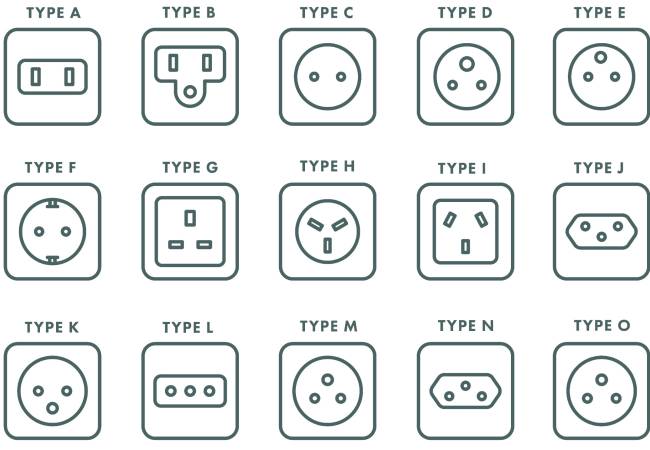
Money
India's currency: Indian rupee (INR). Please note, it is illegal to import or export rupees. Do not accept torn or very dirty Indian banknotes from banks or in change as they will almost certainly not be accepted as legal tender in India. You can normally change money back from rupees into US dollars or British pounds at the departure airport, but you must produce an exchange receipt showing that you changed money in India.
ATM Availability
ATMs are widely available throughout this trip (Visa and Mastercard are best). However, you should not rely on these 100 percent of the time, so bring cash too. Please inform your bank before departure that you are travelling to India and carry the relevant telephone number with you in case they block your card.
You can pay with credit cards in bigger shops all over India. You can bring British pounds or US dollars, but travellers cheques are often difficult to exchange.
Extra Expenses & Spending Money
Many sites now charge a small fee for camera use. Allow at least 600 rupees (approximately US$7) per day for personal expenditure such as snacks, postcards and soft drinks.
India has very good shopping opportunities, especially for locally made goods. During your trip, it is highly likely your local guides will take you to emporiums as well as workshops where these goods are made. Many people find this a great opportunity to buy local handicrafts, silk and carpets. Guides will often assume that visitors will want to go shopping, it is very much part of the culture, but if you do not wish to go, please make this clear to your local guide at the time.
Optional excursions
There are plenty of opportunities for local excursions and cultural experiences throughout this trip, which are detailed in the daily itinerary. For an overview of the optional extras, please see below:
Fort Kochi:
- A harbour cruise around Fort Kochi: 1,650 Indian rupees per person (US$20), based on a minimum of four people
- Kathakali dance show: 700 rupees (US$9) per person, based on a minimum of four people
Munnar:
- Tea museum and factory: Approximately 230 rupees (US$3) per person
- Tea tasting: 410 rupees (US$5) per person, two people minimum
Madurai:
- Night closing ceremony at Meenakshi Amman Temple with local guide: Approximately 1,520 rupees (US$19) depending on group size, minimum four people
Periyar:
Entrance fees to monuments, museums and Periyar Park are included.
- Riverboat cruise: Approximately 900 rupees (US$11) per person, minimum four people – must be confirmed within the first two days of the trip
- Ayurvedic massage: Approximately 1,800-2,250 rupees (US$22-US$27) per person
- Kathakali dance show: Approximately 425 rupees (US$5) per person
- Martial arts performance: Approximately 425 rupees (US$5) per person
Kovalam:
- Day trip to Kanyakumari: 9,900 rupees (approximately US$120) between three people travelling together, or 12,920 rupees (approximately US$156) between four to eight people travelling together
- Padmanabhapuram Palace visit en route to Kanyakumari: 500 rupees (approximately US$6) per person
- Vizhinjam village visit: 7,000 rupees (approximately US$85) between three people travelling together or 9,200 rupees (approximately US$110) between four to seven people travelling together and 14,700 rupees (approximately US$165) between eight to 12 people travelling together. Includes local guide and transport, tipping not included.
Tipping
Tipping is part of the culture in India. However, it can often be an awkward affair, especially when you’re in an unfamiliar country. As such, your tour leader will offer to arrange and look after a tipping kitty, which will be used to tip hotel staff, local guides, bus drivers and other support staff used on the trip.
Your leader will suggest how much to contribute, but it is usually about 3,700 rupees (approximately US$50) per person based on the maximum group size of 16 passengers. For smaller groups, the leader may ask to collect more than the suggested amount relative to the group size, this is to assist with covering the standard tipping expectations for things like the local guides, drivers, and hotel staff (which, are generally fixed amounts no matter the group size).
At any time during the trip, your leader will happily show you an account of how the kitty is being distributed.
Tips for the leader are not included in the kitty and is at your own discretion. If you wish to show your appreciation, around 330-415 rupees (US$4-US$5) per person per day would be appreciated.
Sustainability and Impact
At Exodus, we thrive on travel, and we firmly believe our adventures should help destinations thrive too.
As a certified B Corp, we aim to take a ‘nature positive’ approach across our adventures, including carbon and waste reduction, animal welfare and support for rewilding and conservation. We also seek to contribute to local communities, providing economic opportunity and empowerment.
-
Learn more about our Thriving Nature, Thriving People plan, including our commitment to rewilding 100 square metres for every Exodus traveller
-
Read about the work of the Exodus Adventure Travels Foundation.
-
Find out how you can travel more sustainably here.
Important Information
Water safety
This trip includes time by a lake, river or sea, where there may be opportunities to swim. You should always seek local advice before deciding whether to swim. Open-water or wild swim spots should be treated with extreme caution. Information on how to keep yourself safe while swimming is shown here.
Important Information
Your safe participation
When booking this trip, you should be confident in your ability to participate in all activities described in these Trip Notes. If you have any doubt about your suitability, please call us and ask to speak to one of the experts on this itinerary.
Although our leaders are well trained to deal with different capabilities, if they have any concerns about someone’s ability to safely take part in an activity, or their impact on other people’s enjoyment, we authorise them to take necessary action which, in some circumstances, may involve asking someone to miss that activity.
By booking this trip you agree to our Booking Conditions which clearly state that our leaders have the authority to do this. In these rare instances we will ensure anyone sitting out is safely provided for and offered alternative options where possible. Refunds will not be provided for activities missed and customers may be liable for additional costs incurred.
Seatbelts
All vehicles used by us should be equipped with working seatbelts, except where approved by us based on the vehicle type or journey. Wherever seatbelts are available, we require our customers to use them for their own safety, even where it may not be a legal requirement.
How to Book
- Check availability: Go online to check availability, or contact us by phone or email.
- Secure your place: You can provisionally hold a place on this trip, usually for between three and seven days.
- Complete your booking and payment
When you’re ready to book, go to our website for online bookings, book over the phone or you can complete a booking form (available online or on request by calling us). We accept all major credit and debit cards, or you can pay be cheque.
After booking
You will receive your booking confirmation letter and invoice, which includes extra information and guidance about your travel arrangements.
Full joining instructions, including local emergency numbers and details of how to reach the start point, will be sent to you approximately two to three weeks prior to departure. If you do not receive these at least a week before departure, or require them earlier, please contact our office or your travel agent.
Trip Note validity
These Trip Notes are valid from the “Current as” date on page one. They will occasionally be updated after booking and before departure; if there are any updates that significantly impact the inclusions or itinerary, customers will be written to separately. They will also receive a link to the most up-to-date Trip Notes with their Final Joining Instructions before travelling.
The information in these Trip Notes is given in good faith. Where differences exist between the Trip Notes and our current brochure or website, the Trip Notes supersede the brochure and website. All holidays can be subject to unexpected changes; to enjoy them you should be prepared to be flexible where necessary. Occasionally, it may not be possible to follow the itinerary as planned. This may be for a variety of reasons – climatic, political, physical or other. In these circumstances we will make the best-possible alternative arrangements that maintain the integrity of the original itinerary.
Licensing
Exodus is fully licensed and bonded as a tour operator. We hold Air Traffic Organisers Licence (ATOL) number 2582, issued and bonded with the Civil Aviation Authority (CAA). We are also bonded to the International Air Transport Association (IATA) and we are members of the Federation of Tour Operators (FTO) and ABTA – The Travel Association. This means you can book your Exodus holiday with confidence, as all money paid to us for your trip is fully protected.